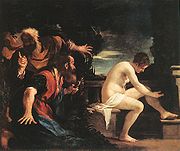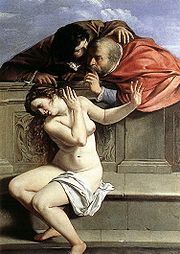Please see discussion on the talk page.
Susanna or Shoshana (שׁוֹשַׁנָּה, Standard Hebrew Šošanna, Tiberian Hebrew Šôšannāh: Egyptian loan: "lily") is part of the Biblical Book of Daniel (Daniel 13) which is considered canonical by Roman Catholics and the Greek Orthodox, and part of the apocrypha by Protestants. Jews recognize it as a moral tale, not part of the Tanakh. It recounts the story of a fair Hebrew wife who is falsely accused by lecherous voyeurs. As she bathes in her garden, having sent her attendants away, two lusty elders secretly observe the lovely Susanna. When she makes her way back to her house, they accost her, threatening to claim that she was meeting a young man in the garden unless she agrees to make love to them.

Susanna and the old men. Guercino

Susanna and the Elders by Artemisia Gentileschi
She refuses to be blackmailed, and is arrested and about to be put to death when a young man named Daniel interrupts the proceedings. After separating the two men, they are questioned about details of what they saw, but disagree about the tree under which Susanna supposedly met her lover. In the Greek text, the names of the trees cited by the elders form puns with the sentence given by Daniel. The first says they were under a mastic (υπο σχινον, hupo schinon), and Daniel says that an angel stands ready to cut (σχισει, schisei) him in two. The second says they were under an evergreen oak tree (υπο πρινον, hupo prinon), and Daniel says that an angel stands ready to saw (πρισαι, prisai) him in two. The great difference in size between a mastic and an oak makes the elders' lie plain to all the observers. The false accusers are put to death, and virtue triumphs.
The Greek puns in the texts have been cited by some as proof that the text never existed in Hebrew or Aramaic, but other researchers have suggested pairs of words for trees and cutting that sound similar enough to suppose that they could have been used in an original. The Anchor Bible uses "yew" and "hew" and "clove" and "cleave" to get this effect in English. Others suggest that the puns were added by the Greek translator and say nothing about the original form of the text.
The Greek text survives in two versions. The Septuagint's text appears only in the Codex Chisianus. The version of Theodotion, is the one that appears in Roman Catholic bibles. It was regarded as a part of the Daniel literature and was placed at the beginning of the Book of Daniel in manuscripts of the Old Testament. Jerome placed it at the end of Daniel, with a notice that it is not found in the Hebrew Bible.
The early Christian consensus accepted the Susanna tale as canonical. Julius Africanus was the exception. Origen observes (in Epistola ad Africanum) that it was "hidden" (compare "apocrypha") by the Jews in some fashion. There are no early Jewish references to the book.
External links[]
- Susanna at Wikimedia Commons
- Jewish Encyclopedia: Susanna
- https://sacred-texts.com/bib/apo/sus.htm : Susanna (Old Greek/Theodotion)
| This page uses Creative Commons Licensed content from Wikipedia (view authors). |